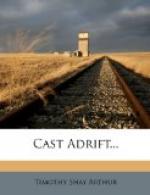“I have laid up in my heart of hearts, dearest of fathers, the precious life-truths that so often fell from your lips. Not a word that you ever said about the sacredness of marriage has been forgotten. I believe with you that it is a little less than crime to marry when no love exists—that she who does so, sells her heart’s birthright for some mess of pottage, sinks down from the pure level of noble womanhood, and traffics away her person, is henceforth meaner in quality if not really vile.
“And so, my father, to save myself from such a depth of degradation and misery, I take my destiny into my own hands. I have grown very strong in my convictions and purposes in the last four weeks. My sight has become suddenly clear. I am older by many years.
“As for George Granger, all I can now say is that I love him, and believe him to be worthy of my love. I am willing to trust him, and am ready to share his lot, however humble.
“Still hold me in your heart, my precious father, as I hold you in mine.
“Edith.”
Mr. Dinneford read this letter twice. It took him some time, his eyes were so full of tears. In view of her approaching marriage with Spencer Wray, his heart had felt very heavy. It was something lighter now. Young Granger was not the man he would have chosen for Edith, but he liked him far better than he did the other, and felt that his child was safe now.
He went to his wife’s room, and found her with Edith’s letter crushed in her hand. She was sitting motionless, her face pale and rigid, her eyes fixed and stony and her lips tight against her teeth. She did not seem to notice his presence until he put his hand upon her, which he did without speaking. At this she started up and looked at him with a kind of fierce intentness.
“Are you a party to this frightful things?” she demanded.
Mr. Dinneford weakly handed her the letter he had received from Edith. She read it through in half the time it had taken his tear-dimmed eyes to make out the touching sentences. After she had done so, she stood for a few moments as if surprised or baffled. Then she sat down, dropping her head, and remained for a long time without speaking.
“The bitter fruit, Mr. Dinneford,” she said, at last, in a voice so strange and hard that it seemed to his ears as if another had spoken. All passion had died out of it.
He waited, but she added nothing more. After a long silence she waved her hand slightly, and without looking at her husband, said,
“I would rather be alone.”




